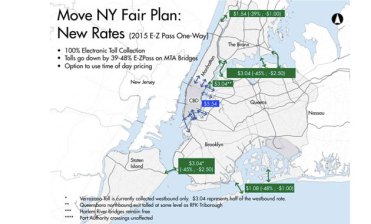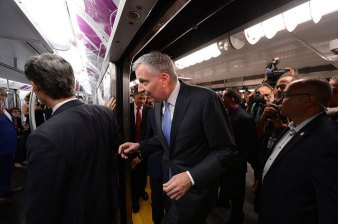Q Poll: Move NY’s Toll Swap Jacks Up Public Support for Road Pricing

A new poll released by Quinnipiac today reveals how much New Yorkers warm to the idea of tolling the East River bridges when the policy is paired with lower tolls on outlying crossings. A lot: Support for putting a price on the free bridges rises from 27 percent to 44 percent if accompanied by toll reductions and using the revenue “for mass transit.”
Citywide, the poll of 969 NYC voters (margin of error: 3.2 percent) found opposition to the Move NY-esque toll swap idea below an absolute majority, but at 49 percent, it had a slight plurality.
In the Bronx and Manhattan, pluralities do support toll reform, and in Staten Island it enjoys a solid 61 percent majority. Most voters in Brooklyn and Queens were opposed, but only in Brooklyn did the margin of opposition reach double digit percentage points. The results are broadly similar to recent polling conducted by Move NY.
Pricing the East River bridges out-polled raising the city sales tax as a means to pay for transportation infrastructure, 24 to 13 percent. Raising the gas tax statewide was, not surprisingly, more popular with city voters, though not by much, with 29 percent choosing that option. That question didn’t mention reducing outlying tolls, so it probably underestimates where toll reform stands relative to the other options.
Also notable, the toll swap is supported by 52 percent of independent voters but opposed by 52 percent of both Democrats and Republicans. In practice, it’s Democratic voters who determine the city’s representation in Albany and City Hall.
Surveying New Yorkers about tolls, traffic, and transit is tricky, with the numbers swinging dramatically based on turns of phrase. Q polls of congestion pricing in 2008 found support in the range of 60 percent when the question said revenue would be used “to improve mass transit in and around New York City,” but that fell to about 40 percent when pollsters described the idea only in terms of “charging vehicle owners.”
So what do the numbers tell us? Broadly speaking, the New York City electorate remains receptive to the idea of road pricing to fund transit — more receptive than residents of Stockholm and London before those two cities implemented congestion pricing. And maybe some more electeds in the Bronx and Staten Island should join the coalition supporting Move NY.
We know from the experience of other cities that once a pricing plan goes live and people can see the benefits, support grows. There’s no wall of public opposition holding back the Move New York plan, just political timidity.


